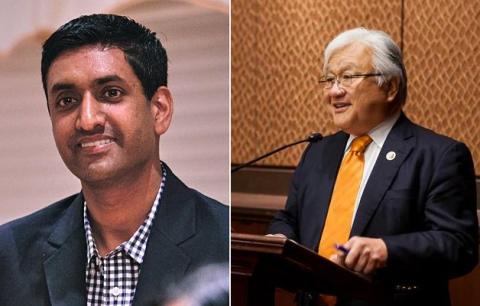Image - Left: Candidate Ro Khanna / Right: Congressman Mike Honda
Incumbent Democratic U.S. Representative Mike Honda has been a popular fixture in the House of Representatives since his first election in 2000. He has not been seriously challenged for the seat since, usually drawing upwards of 70 percent of the popular vote each election.
This does have its advantages for constituents. A well-liked representative allows for less time campaigning and fundraising, and more time in the capitol.
However, the nonpartisan top-two primary now presents the prospect of competition in these "safe" districts. In California's 17th District, Democratic candidate Ro Khanna is providing an ample amount of competition for Honda.
Khanna leaped into the race with substantial support from many of the large players in Silicon Valley's famous technology sector. Consequently, he's done so without a dollar from a political action committee (PAC).
Honda has countered by showcasing his support and influence in Washington D.C., sporting endorsements from President Barack Obama, Vice President Joe Biden, and House Minority Leader Nanci Pelosi, among others.
Of added interest to the campaign is that this district sits on the currently explosive fault line between the technology industry and the government. Nowhere is the cross section of politics and technology more prevalent than the 17th District, which boasts companies such as Facebook, Google, Yahoo, and Apple. Likewise, revelations about the government's intrusion of individual's private cyber information have led more political watchers to the district.
Independents and Republicans now have more of a voice when determining which likely candidate they support, as chances of electing a non-Democrat in this district are low. But, the climate and challenges posed by this breed of election are new.
Both Khanna and Honda weighed in:
What are the challenges you face in running against a fellow Democrat? Does this change the way you interact with voters of differing political affiliations?
Candidate Khanna:
"Competition is fundamental to the Democratic process and it elevates our ideas and holds our elected leaders accountable.No incumbent Congressman, Democrat or Republican, should be immune from competition. That’s part of the problem with our politics today; folks get elected to these seats and remain there forever; while the world is going through profound changes, our politics remains the same. The people I speak with in the district feel that Congress isn’t working and it’s time for people with new ideas who are willing to challenge the status quo.Ultimately, the people of the 17th District will decide who best represents them in Congress and I believe in giving voters in the 17th district that choice."
Congressman Honda:
"I will work hard to earn the support and votes of everyone in the 17th Congressional District regardless of political affiliation. This has been the case in every election I have run for, and it is no different in my current re-election campaign."
The race for California's 17th District in 2014 will be an interesting one to watch as the two frontrunners are Democrats. It has implications on how intra-party competition can impact the effectiveness of the democratic process. It will also determine who will represent arguably the most techno-political region in the nation.
